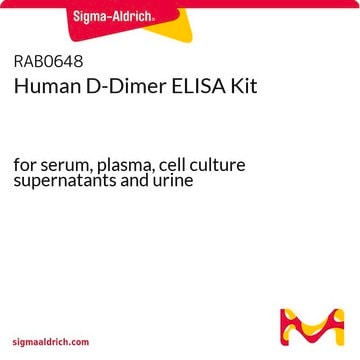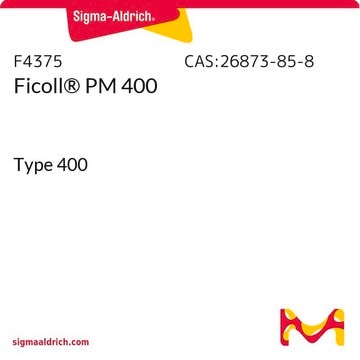D9321
D-dimer, Human
from human plasma, buffered aqueous solution
Sinónimos:
Fibrin degradation fragment, Fragment D-dimer
Iniciar sesiónpara Ver la Fijación de precios por contrato y de la organización
About This Item
UNSPSC Code:
12352204
NACRES:
NA.61
Productos recomendados
biological source
human plasma
Quality Level
form
buffered aqueous solution
mol wt
Mw ~200 kDa
shipped in
wet ice
storage temp.
−20°C
General description
The human D-dimer(s) protein is an indicator of a thrombosis event. This protein is the degradation fragment of fibrin mesh that has been stabilized by Factor XIII. This factor crosslinks the E-element to two D-elements. As a result, this crosslink is the final step in the generation of a thrombus.
Application
The human D-dimer protein is a blood test performed in the medical laboratory to diagnose thrombosis. While a negative human D-dimer result rules out thrombosis, a positive test result can indicate thrombosis or other underlying potential health problems. The presence of D-dimer can idicate the existance of a deep venous thrombosis (DVT) or pulomonary embolism (PE).
Physical form
The human D-dimer protein provided in liquid form constisting of 0.05 M sodium phosphate, pH 7.5, 0.15 M sodium chloride and 0.09% sodium azide.
Disclaimer
RESEARCH USE ONLY. This product is regulated in France when intended to be used for scientific purposes, including for import and export activities (Article L 1211-1 paragraph 2 of the Public Health Code). The purchaser (i.e. enduser) is required to obtain an import authorization from the France Ministry of Research referred in the Article L1245-5-1 II. of Public Health Code. By ordering this product, you are confirming that you have obtained the proper import authorization.
Storage Class
10 - Combustible liquids
wgk_germany
WGK 1
flash_point_f
Not applicable
flash_point_c
Not applicable
Certificados de análisis (COA)
Busque Certificados de análisis (COA) introduciendo el número de lote del producto. Los números de lote se encuentran en la etiqueta del producto después de las palabras «Lot» o «Batch»
¿Ya tiene este producto?
Encuentre la documentación para los productos que ha comprado recientemente en la Biblioteca de documentos.
Los clientes también vieron
Nuestro equipo de científicos tiene experiencia en todas las áreas de investigación: Ciencias de la vida, Ciencia de los materiales, Síntesis química, Cromatografía, Analítica y muchas otras.
Póngase en contacto con el Servicio técnico








